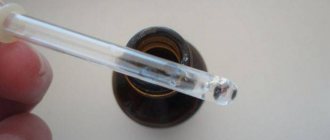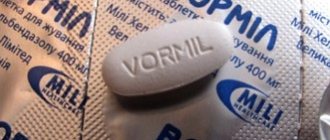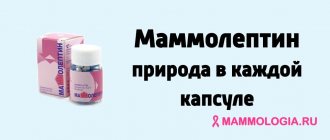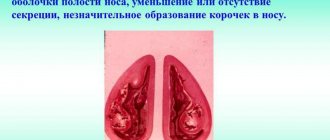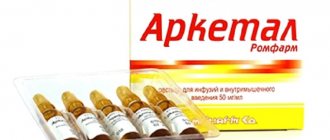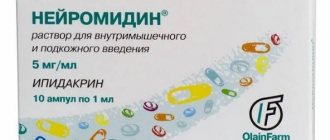January 10, 2019
“Stomatidin” is one of the few broad-spectrum drugs that are actively used in dentistry to solve dental problems, and have almost no side effects. Naturally, this statement is only true if you do not neglect the instructions for use and use the composition in acceptable dosages. The price of the medicine, with all its positive advantages, is also very reasonable - about 190 rubles per 200 milliliters. All that remains is to find out about the features of this product, and the editors of the UltraSmile.ru portal will help you with this.
Pharmacological authorities
Pharmacodynamics.
Hexetidine is a broad-spectrum antimicrobial agent. This is effective in vivo
, and
in vitro
against gram-positive and gram-negative bacteria, as well as yeasts (
Candida albicans
) and fungi. The antibacterial effectiveness of hexetidine is due to its antimetabolic action due to the amino acid thiamine, which is necessary for the growth of bacteria and fungi.
Pharmacokinetics.
After a one-time rinse, hexetidine is absorbed from the mucous membrane of the mouth and throat and into the dental fluid for 8-10 years, in other cases – for the last hour (up to 65 years).
Daily research in humans on the absorption of hexetidine when locally applied as a medicinal product, Stomatidin® 0.1% dose.
Daily specific research for the medicinal use of Stomatidine® 0.1% or hexetidine in case of narcotic/liver insufficiency and for patients of the summer age.
Reviews from those who have used the medicine
As reviews show, people mainly use Stomatidine for stomatitis. The drug copes with its task perfectly.
“The instructions say that the medicine should not be given to children under 4 or five years of age. And my Egorka recently had stomatitis as a consequence of a sore throat. So he was only 2.5 years old, and the doctor recommended “Stomatidin” - they smeared it on his gums directly from the cotton wool, because They were afraid that he would swallow it. And it helped a lot, by the way. We didn’t notice any side effects. But of course I wouldn’t risk giving it myself.”
Anna, babyblog.ru
“I gave my daughter Stomatodin. She is 5.5 years old. True, without a doctor's prescription. I poured it into the cap that screws the bottle on, and she swallowed it all. We were very scared, we even called an ambulance and gave us activated charcoal. The doctors told me to monitor my condition and call if anything happened; they also warned me that this could cause a complication on my kidneys and even advised me to take a urine test if I was really worried. Everything turned out fine for us, but girls, be careful with this medicine, especially when you give it to children, even if they are older than indicated in the instructions.”
Aliya, komarovskiy.net
“It smells and tastes kind of disgusting, although some say it’s supposedly sweet. Personally, our son was prescribed it to treat his throat, but it didn’t work. It caused a gag reflex even without swallowing, although I had to apply it on gauze and almost push it down my throat to treat the inflamed areas.”
KlaraT, otzovik.com
“I will say that the drug is quite weak, it works only in complex therapy, and as an independent remedy it has little effect. And I also noticed a side effect: after taking it, food changed its taste. For example, I eat salty food, but it tastes bitter. And this happened all the way while they were being treated. The course of treatment was 7 days.”
Mamaeva Tatyana, woman.ru
Notice
: Undefined variable: post_id in
/home/c/ch75405/public_html/wp-content/themes/UltraSmile/single-item.php
on line
45 Notice
: Undefined variable: full in
/home/c/ch75405/public_html/wp-content /themes/UltraSmile/single-item.php
on line
46
Rate this article:
( 4 ratings, average: 5.00 out of 5)
prevention
- According to the official website of the manufacturer bosnalijek.eu
Consulting specialist
Soblirova Alena Maksimovna
Doctor rating: 9.7 out of 10 (3) Specialization: Dentist-therapist Experience: 12 years
Features of good stagnation
Stomatidine® should be administered with caution in patients with epilepsy. Drug treatment can change the epileptic stage and cause seizures in children.
Use caution in patients with allergic reactions, including bronchial asthma, especially in patients with allergies to acetylsalicylic acid.
When the fire becomes intense, the medical staff will need to pin the trace and go to the doctor.
If a sign of hypersensitivity to a medicinal agent appears, it is necessary to immediately take the drug.
In the hour of stagnation of the doctor, there is no trace of inhalation, fragments of wounds can be consumed in the air and cause laryngospasm.
Additional speeches:
Levomenthol. This risk is caused by laryngospasm in children due to the presence of levomenthol.
Ethyl alcohol (ethanol). It is recommended to use 10% ethanol, which should be used with caution in patients with liver disease.
Azorubin (E122). You may have an allergic reaction (this is important if you have an episode of insensitivity to the medicinal procedure).
Trival stagnation is not recommended (do not stagnate for more than 10 days without a doctor’s recommendation).
Suspension during pregnancy or breastfeeding.
No well-controlled clinical studies of hexetidine administration to women during pregnancy or breastfeeding have been conducted. It is unknown whether hexetidine or its metabolites are present in breast milk. The ability of hexetidine to be absorbed systemically is negligible. It is unlikely that the use of hexetidine during pregnancy or breastfeeding causes harm to the fetus or child.
However, hexetidine should not be used during pregnancy or breastfeeding, as long as the potential benefit of treatment for the mother outweighs the possible risk for the development of the fetus or child.
This is due to the fluidity of the reaction during treatment with vehicles or other mechanisms.
Doctor's purpose is to mix ethanol. It is not recommended for water users to drive a car for 30 minutes after stopping the medication.
Comments
A week ago I had a tooth removed after periodontitis. Three days after this, sharp pain appeared. I saw a doctor only on the sixth day. It turned out to be alveolitis. She prescribed me to rinse my mouth with Stomatidine, and also to put tampons soaked in the solution into the hole. I have Chlorhexidine at home. I read that it can also be used for this disease, isn’t it better to save money?
Ivan (01/22/2019 at 02:14) Reply to comment
- Dear Ivan, as for Chlorhexidine, you can read an article about the benefits and properties of this wonderful drug on our website. But as far as recommendations are concerned, we still advise you to listen to what your doctor says and use Stomatidine. You will be interested to know that some studies based on the comparison of these two drugs have shown the greater effectiveness of Stomatidine when used during the treatment of alveolitis. Due to its prolonged antibacterial and anti-inflammatory action, the solution helps to achieve 100% sterility of the socket and actively affects the microflora of the socket, which provoked the development of a purulent-inflammatory process. With it, the treatment process will occur faster than with Chlorhexidine.
Editorial staff of the portal UltraSmile.ru (01/27/2019 at 08:44) Reply to comment
Can the drug be given to elderly people over the age of 60 when the person had stomach problems and there will be no side effects. From your article, I simply did not find any recommendations on the use of Stomatidine for people of retirement and elderly age.
Yana (01/30/2019 at 08:50) Reply to comment
- Yana, this medicine cannot be taken orally, so there should be no consequences for the gastrointestinal tract. According to the instructions, there are no (upper) age restrictions.
Editorial staff of the portal UltraSmile.ru (02/01/2019 at 07:14) Reply to comment
What can you say about the recommendation for using the product “Stomatidin” and rinsing the mouth with soda? Will there be any problems if you periodically use both options to improve the health of your gums and teeth?
Polina (01/30/2019 at 04:18 pm) Reply to comment
- Both remedies should be used as prescribed by a doctor and in accordance with the recommendations that he gives specifically in your situation.
Editorial staff of the portal UltraSmile.ru (01/31/2019 at 15:17) Reply to comment
Good afternoon. For many years, I have been getting stomatitis in my mouth. At first I didn’t pay attention to it, but when it became more frequent, I decided to see a doctor. I couldn’t achieve any results, and then one evening, while browsing the Internet, I saw this site, where I found an article about the treatment of stamatitis, it soon went away for me and my life improved. Thank you.
sasha11 (01/30/2019 at 06:15 pm) Reply to comment
- Thank you! Your comment is an indicator to us that our work is not in vain!
Editorial staff of the portal UltraSmile.ru (01/31/2019 at 15:12) Reply to comment
A child's tooth was removed. The doctor prescribed Stomatidin. But the recommendation for using the product “Stomatidin” states that it is not used in children under 5 years old (we are almost 4 years old)?
Natalya (02/03/2019 at 23:27) Reply to comment
A child's tooth was removed. The doctor prescribed Stomatidin. But the recommendation for using the product “Stomatidin” states that it is not used in children under 5 years old (we are almost 4 years old)? Or maybe choose some other remedy?
Natalya (02/03/2019 at 23:27) Reply to comment
The recommendations for using the product “Stomatidin” turned out to be certainly useful, but is there any point in taking a smaller dose or diluting it to save money or there will be no results?
Lera (02/04/2019 at 18:00) Reply to comment
The recommendations for using the product “Stomatidin” have become very useful for me, thank you) If you think about it thoroughly, is it still better to take an aerosol or a solution? Or is it better to do both, an aerosol on the road and a solution at home?
Anna (02/04/2019 at 18:15) Reply to comment
Due to long-term drug treatment, I developed stomatitis. We prescribed this drug and it helps a lot. Now my 3.5 year old daughter has the same problem. I understand that it cannot be given to small children because they swallow the medicine. And if the child knows how to spit (brush her teeth herself), can you treat the gums with a small amount?
Zhanna (02/04/2019 at 08:48 pm) Reply to comment
Recommendations for using the drug "Stomatidin" are certainly useful, but if you reduce the dose and drink two or even three times less, you can drive and will the drug be of any use?
Sveta (02/12/2019 at 11:15) Reply to comment
Write your comment Cancel reply
Method of congestion and dosage
Stomatidin®,
Razchin 0.1%, purposes for municipal stagnation in empty mouths.
Wash your mouth or gargle with 15 ml of undiluted rozchinu vprodovzh ½ hvilini 2 - 3 times per dose.
The drug cannot be used.
For rinsing vikorista and non-dilution of roses.
The severity of the treatment is determined by the doctor depending on the level of severity and characteristics of the illness.
Do not hesitate to treat persistent symptoms.
Children.
It is not recommended to use medicine for treating children under 6 years of age.
Causes and forms of stomatitis
With stomatitis, ulcers are located on the lips and cheeks, covering the bottom of the mouth, the area under the tongue, on the palate and tonsils. The pathology can be recognized by the characteristics of the wounds: they are round or oval, have a whitish center and smooth edges, and there is a red halo around them.
Causes of stomatitis:
- trauma to the mucous membranes of the mouth;
- use of hygiene products with sodium sulfate;
- psycho-emotional instability;
- lack of vitamin food;
- alcohol and cigarette abuse;
- allergy;
- hormonal disbalance;
- bacterial activity;
- some diseases;
- dehydration;
- low-quality dentures.
Stomatitis often recurs. Most often, the disease first develops in patients aged 10-20 years. The disease is not contagious, but in most people it is chronic.
Forms of stomatitis
- Fungal. It is provoked by yeast-like fungi. The disease is typical of children whose saliva does not contain enough acidic elements to fight pathogens.
- Herpetic. This type of stomatitis is caused by the simple herpes virus. Infection can occur at home and through airborne droplets.
- Bacterial. It develops when, due to injury, an infection gets into the wound.
- Allergic. It is a symptom of a severe allergic reaction.
- Erosive-ulcerative. Extensive damage to the oral mucosa.
- Catarrhal. The condition is considered to be a mild form of allergy.
Overdose
Hexetidine at the recommended dose is not toxic. Daily data on episodes of hypersensitivity to hexetidine, which led to a hypersensitivity reaction.
Symptoms
It is necessary to place the medicinal fragments in the warehouse with ethyl alcohol, then when the wound is dry, you can soak up some of it. Horror alcohol withdrawal is even less likely, but is theoretically possible when a large dose of the drug is administered to a small child.
Likuvannya.
In case of any episodes of overdose, you must immediately consult a doctor. Carrying out symptomatic therapy, as with alcohol intoxication, although such treatment is rarely necessary. Washing the tube lasts for 2 years after rinsing the supernumerary dose.
Keep out of the reach of children. In case of overdose, it is imperative to seek medical help.
Features of Stomatidin for stomatitis
Stomatidin is one of the best remedies for dental pathologies. This is an effective antiseptic drug based on hexetidine.
Stomatidin is available in the form of an alcohol solution and is available without a prescription. The drug has a red tint. The average price of the drug is 190 rubles.
Excipients of Stomatidin:
- menthol;
- saccharin;
- lemon acid;
- polysorbate;
- ethanol;
- azorubine;
- propylene glycol;
- water.
Stomatidin is widely used to treat pathologies of otolaryngology and dentistry. This is one of the most reliable and proven remedies on the modern pharmacological market.
The medicine combines well with other drugs. Stomatidin is approved for use during pregnancy and lactation due to the fact that it acts locally and cannot be absorbed into the placenta. The drug does not affect the reaction rate, so it can be taken while driving.
Side effects
Stomatidine ® should be well tolerated and should be used in case of severe congestion.
On the side of the immune system: hypersensitivity reactions, including angioedema, angioedema, laryngospasm, bronchospasm.
On the side of the nervous system: ageusia, dysgeusia, change of savory tastes for 48 years (the taste of “sweet” can be changed to the taste of “bitter”).
On the side of the respiratory system: cough, shortness of breath, laryngospasm.
On the side of the herbal system: dry mouth, dysphagia, increased swelling, pain when walking. In case of a seizure, treatment with a medicinal patient may result in bowel-intestinal disorders, first of all, boredom and vomiting.
On the side of the skin and subcutaneous tissue: allergic contact dermatitis, angioedema.
Zagalny damage and stanza place of stagnation: local reactions, including a reverse change in the color of the teeth and tongue; sensitivity of the mucous membrane (liver, as the name implies); soreness (soreness, heat, itching) of the tongue and/or mucous membrane of the mouth; decreased sensitivity; paresthesia of the mucous membrane; burning; pukhirtsi; vineyard of virazoks on mucus membrane.
When taking azorubin, it may cause allergic reactions, including bronchial asthma, especially in patients with an allergy to acetylsalicylic acid.
Medical practitioners, patients, pharmacists are asked to report any suspicion of adverse reactions or the presence of a therapeutic effect by email to the representative office of Bosnalek dd.
Indications and contraindications
The main contraindication to the use of Stomatidin is individual intolerance to hexetidine or the auxiliary components of the drug. The medicine is not intended for patients under 4 years of age.
Conditions that require the use of Stomatidin:
- different forms of stomatitis;
- gingivitis (inflammation of the gums);
- periodontitis and periodontal disease;
- alveolitis (suppuration after tooth extraction);
- candidiasis;
- glossitis (inflammation of the tongue);
- oral injuries;
- infectious foci of a viral nature in the teeth;
- bacterial infection;
- otolaryngological pathologies (laryngitis, pharyngitis, tonsillitis);
- damage to the larynx;
- after surgery in the oral cavity and larynx;
- prevention of caries;
- for oral hygiene in case of unpleasant odor;
- prevention of malignant tumors of the mouth and larynx.
Side effects when treating stomatitis with Stomatidine are rare. Sometimes local irritation, an allergic reaction, numbness of the tongue, impaired taste and smell occur. If at least one adverse reaction occurs, you should stop using the drug. If symptoms do not go away on their own, you should immediately consult a doctor.
Side effects
Let's look at what side effects Stomatidin can cause. The instructions for use describe that the solution rarely causes negative reactions even after long-term treatment. However, there is a risk of side effects:
- local dryness, burning of the mucous membrane, discomfort or pain, numbness;
- allergic reactions in the form of redness, rash, itching, extremely rarely - bronchospasm, Quincke's edema;
- impaired perception of taste or smell.
Some patients complain that after using Stomatidin, the tongue and teeth become stained.
An allergy indicates increased sensitivity to the components of the drug, then you need to stop taking it. The doctor will help you choose a more appropriate remedy. All other adverse reactions disappear after use.
special instructions
Stomatidin is allowed to be used after a doctor's prescription. Despite its apparent safety, it can cause harm.
The drug should not be used by patients who cannot rinse their mouth or throat for some reason. If the inflammatory process intensifies, you should stop treatment with the solution or spray. It is also worth doing if symptoms of an allergy to the components of Stomatidin appear.
The medicine is used with caution by patients with epilepsy. It can reduce the epileptic threshold of activity and cause seizures in children. Only after consulting a doctor, the drug is included in the treatment regimen for patients with a tendency to allergic reactions (especially allergies to acetylsalicylic acid) and asthma.
Due to the presence of ethanol in the composition, Stomatidin is used under medical supervision by patients with liver diseases. For the same reason, you need to take the drug at least half an hour before work related to concentration and reaction speed (including driving a car).
Analogs
This group includes drugs that contain various active substances with Stomatidin, but are also used to treat infections of the oral cavity and pharynx.
Analogues of Stomatidin:
- Medacept based on ethanol has an antiseptic and irritating effect. Not prescribed for children under 14 years of age or for acute skin inflammation.
- Hexicon with chlorhexidine bigluconate perfectly disinfects, but does not affect acid-resistant pathogenic microorganisms.
- Decathylene with dequalinium chloride stops the development of bacteria, fungi, and relieves pain.
- Givalex, based on benzyldimethyl ammonium chloride monohydrate, inhibits the development of pathogens.
- Faringosept with ambazon is effective against streptococci, staphylococci, and pneumococci. Can be used as monotherapy.
If there are contraindications to hexetidine, the solution can be replaced with the drugs described above.
